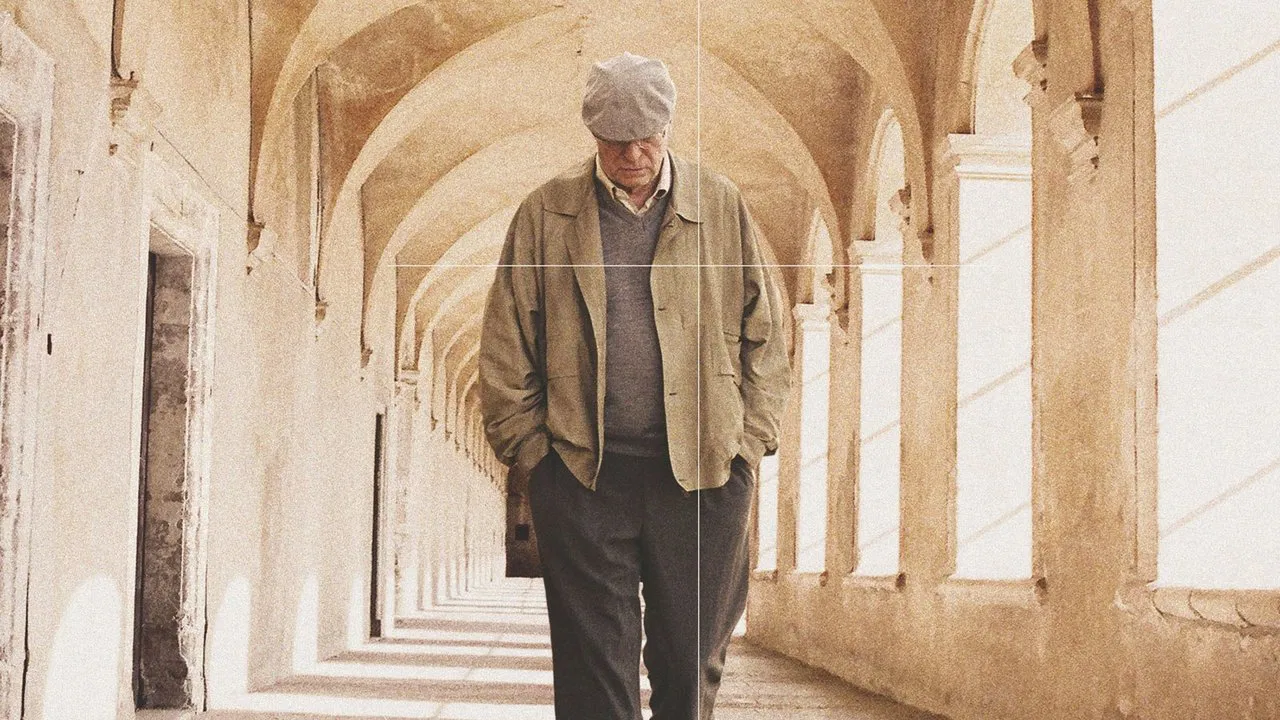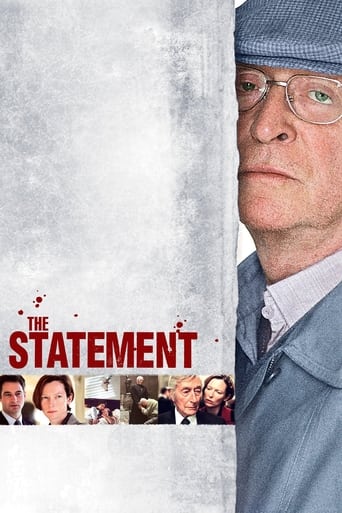

I had seen The Statement when it was released 14 years ago, and I remembered it as dull and, well, unmemorable. But when it turned up streaming, I decided to give it another try, largely because of the story, but also the cast. On second viewing, the performances do not disappoint. Unfortunately, they are not showcased in a well-crafted or well-conceived movie. NB: Serious spoilers follow. Also, first, two caveats.1. The film is based on the Brian Moore novel of the same name, which itself is based on the life of a Nazi collaborator named Paul Touvier. I haven't read the novel, but in the film, the dramatic ending is complete fiction, because Touvier died of prostate cancer in prison. In fact, from what I've read of Touvier-- who was a thoroughly despicable man-- this film is fictionalized almost beyond the bounds of historical fact.2. Though it was filmed in the South of France, the movie is British and Canadian. It takes an Olympic leap of faith to accept players from Alan Bates to Tilda Swinton to Ciaran Hinds as French, and no one more so than everybody's favorite Cockney lad, Michael Caine, as Pierre Brossard (the fictional Touvier), but it's a crucial leap, so limber up. When we meet Brossard, he is still haunted by his war crime, which is shown in black- and-white flashbacks: in 1944, he executed seven Jews near Lyon. My problems began there, because I didn't believe in his contrition. Instead, I suspect that the filmmakers attached the flashbacks to his memory just as a convenient way showing the crimes and therefore conveying the gravitas of his actions to the audience. His contrition, if any, is also inconsistent with the rest of Brossard's character, but it does have the added benefit of making his ardent Catholicism a critical element of the plot But never mind. Let's say he was haunted. He is also now hunted, because of a new law about "crimes against humanity" which makes him retroactively a criminal. Unfortunately, that raised the next problem. I felt almost no suspense in what is inherently a suspenseful story- - a hunt. We naturally wonder, of course, if Brossard will escape, but this is a tedious film. The opening sequence sets the pace. Grey- haired and sweater-vested, Brossard is spotted in a cafe by an assassin. Brossard drives off, the methodical assassin follows, and they meander along, up into the hills around Aix. We watch them for several minutes, with one or two other cars coming and going. Close- ups are mixed with aerial shots, but there is no energy, and without energy a chase scene is a traffic update.The one suspenseful scene, oddly, has little to do with somebody being hot on somebody else's tail, although there is a tail. Brossard seeks refuge with his estranged wife (Charlotte Rampling), who dotes on the dog he had given her years ago, an aging pet he threatens to kill if she doesn't help him. My suspense-meter started spinning in that scene, but nothing comes of it. (As an aside, couldn't it have been a new puppy? Just to have something bouncy in the movie?) Even when he's escaping over rooftops, I found myself wondering if the old guy would slip and fall rather than if he'd be caught or shot. When he stops to catch his breath and check his watch while he's making a getaway, I checked mine, too. Lest this review seem like a simple lament that Norman Jewison is not Alfred Hitchcock, let me quickly change gears: I'm not looking for Bullitt-esque chase scenes. Nor do I care if the actors are, as one IMDb reviewer said, "long in the tooth" (Who did he expect to see in a movie about people surviving 50 years after World War II? A Daniel Craig, or even Radcliffe?) Let me, as they say, cut to the chase:The characters are necessarily geriatric, but the film didn't have to be. More time could and should have been spent on motives and methods of the chasers than on the tiresome chase itself. Whether they're out to get Brossard or to shelter him, the complexities, and indeed the morality of the motives, are not fully explored, though they involve fascinating factions: First, the French government (Jeremy Northam as a police colonel, Tilda Swinton as a jurist, Alan Bates as a minister, John Neville in an unspecified role of power). Second, fellow survivors of the Vichy regime, who are also in danger of being hunted, or betrayed by Brossard if he is caught and successfully interrogated or manipulated. Third, there is the suggestion that a faction of Nazi hunters are in play, but this is muddy. Fourth, and perhaps most profoundly, the Catholic church, in whose picturesque abbeys Brossard finds protection as a devout and at least superficially penitent believer. That is, until Rome cuts him off. That is where the focus should have been-- on the conflicting motives of these factions, years after the war-- because in effect, Brossard was finally nothing but a pawn caught helplessly in the forces of history. But this film has no force, and is disappointingly vague on history.
... View MoreFrance in the early 1940s was hell on earth . Nazis would round up Jews and execute them in cold blood . We know this because this is how THE STATEMENT begins . What we didn't know was that London geezers participated in the cruel murders . It's so obvious you can't ignore it because the victims are told to stand against the wall as in " Cor blimey guv . If it ain't a bunch of Jewish geezers we're going to murder . And after I've murdered them I'll be popping up the apple and pears to see me old china Mary Poppins for a rendition of me old bamboo and knees up mother brown " For goodness sake if you're going to portray French people then please get someone to at least try and make a go of a French or vaguely European accent . Words fail to describe how bad the opening sequence is having Michael Caine dub over a French character . At best it's unintentionally funny , at worst it's offensive . Seeing characters being murdered due to their perceived race is no laughing matter As for the rest of the film it's beautifully shot but boring and once again I have to point out that not one single character sounds like they're French . Not only that you're never even convinced that Tilda Swinton's character is female , her dialogue seems as if it's written for a man . It's also without doubt the worst film Michael Caine has starred in for several years and his bizarre out of place performance reflects this
... View MoreI just saw this movie and I don't agree with mostly of the comments I have seen here. Is a very good thriller, with good performance of the cast and fine direction and photography. The sound is really superb and that's why the movie got the prizes. Further comments are out of order. I'll see it again to watch the goof and enjoy the acting. I was wondering if the story is real, many of the collaborators not only in France, but in the occupied countries for sure lived in some way the same experiences more or less. Ten points for the sound, and the photography. For the movie as a good thriller, I will say 7 points.And that's all.
... View MoreNorman Jewison, he's an sly old fox, you cannot expect him to make an avant- garde/revolutionary movie at this stage, he won't... but his name is synonymous with "quality", and that ain't to be sniffed at."The Statement" is such a good suspense movie about an former french soldier which served in Vichy's army and committed some "crimes against the humanity". 50 years after the WWII is over there are a lot of people who want his head: some are afraid of what he may tell to the authorities, some just want to arrest him. There's sort of a critique of Catholic Church's attitude during the Holocaust (how they turned a blind eye to it), and after it (sheltering some Nazis that had a warrant for arrest).The movie has kind of a classic style, it's been brilliantly filmed and the presence of Michael Caine is nothing but a nice present for all those who love cinema.*My rate: 7/10
... View More